Topic: biomedical engineering
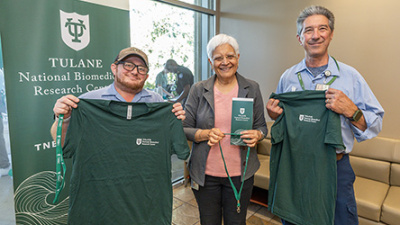
Renowned Tulane Center Adopts New Name Reflecting Broader Biomedical Research Mission
The Tulane National Primate Research Center is now known as the Tulane National Biomedical Research Center, a designation that better reflects its breadth of research and growing contributions to public health.
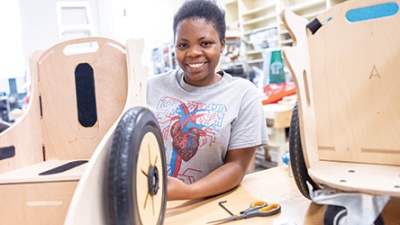
Engineering a Brighter Future
From expanded programs to world-class faculty to highly engaged students, engineering at Tulane is growing stronger every year.
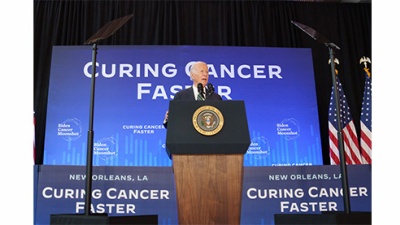
President Biden Announces Funding to Tulane for Cancer ‘Moonshot’ Project
President Joseph R. Biden Jr. and First Lady Jill Biden visited Tulane to celebrate a project that promises to bring a new kind of magic to the world of cancer treatment.
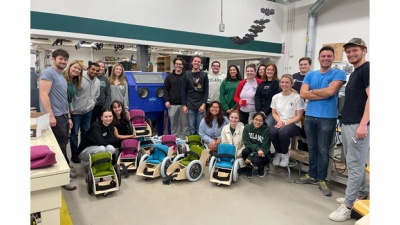
Biomedical Engineering Students Create Child-Size Wheelchairs
Even with a pediatric wheelchair, learning how to get around on wheels can be challenging for a child, especially one with cerebral palsy, spina bifida or a limb deficiency. That’s when Tulane engineering students came in to help.

endometriosis Detection
Four School of Science and Engineering students won the grand prize at the eighth annual Tulane Novel Tech Challenge for their design of a home-use test to detect endometriosis. Named Team Fleur FemTech, the group developed a tool that utilizes lateral flow technology and antibody detection techniques to determine if a person has elevated levels of antibodies associated with endometriosis.https://tulane.it/endometriosis-detection
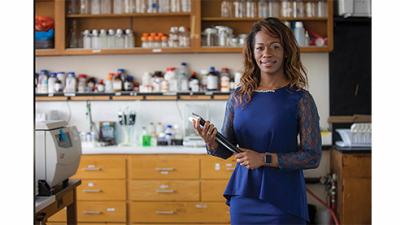
Trivia Frazier: Research Scientist & Business Innovator
Trivia Frazier (SSE ’08, M ’12, B ’18), president and CEO of Obatala Sciences, is passionate about her company’s work and is thrilled to be blazing a path for others interested in bioengineering research.

ALTERNATIVE TO OPIOIDS
Michael J. Moore, a professor of biomedical engineering at the School of Science and Engineering, is part of a national study that aims to provide solutions to the national opioid overdose crisis by creating a living bioengineered nerve circuit that mimics the pain transmission pathway in the spinal cord. The circuit of living cells is designed to help scientists test the effectiveness of non-addictive alternatives to opioid painkillers.https://tulane.it/alternative-to-opioids

“Make 48” Team
A group of Tulanians competed in the APT/PBS reality show “Make 48,” a MakerSpace-inspired show in which student teams have 48 hours to plan, prototype and pitch a new commercial product idea to a panel of judges. The team, called The Big Easy, consisted of Kyra Rubinstein, a junior majoring in biomedical engineering, Matthew Nice, a biomedical engineering graduate, Luke Artzt, an engineering physics graduate, and Jesse Williams, a School of Architecture graduate.https://tulane.it/make-48-team
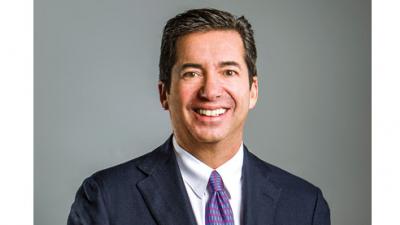
Makerspace Named in Honor of Donor, Alumnus
The MakerSpace at Tulane University, which offers students and professors access to digital fabrication tools like 3D printers, laser cutters, milling machines and lathes as well as traditional hand and power tools, will be named the Scot Ackerman MakerSpace, thanks to a generous gift from Dr. Scot Ackerman (E ’78), a radiation oncologist and medical director of the Ackerman Cancer Center in Jacksonville, Florida.

Cancer Scanner
J. Quincy Brown, associate professor of biomedical engineering, has been awarded a $1.6 million four-year grant from the National Cancer Institute of the National Institutes of Health to develop a tool that could lower tumor recurrence in cancer patients, especially those with prostate cancer.








































